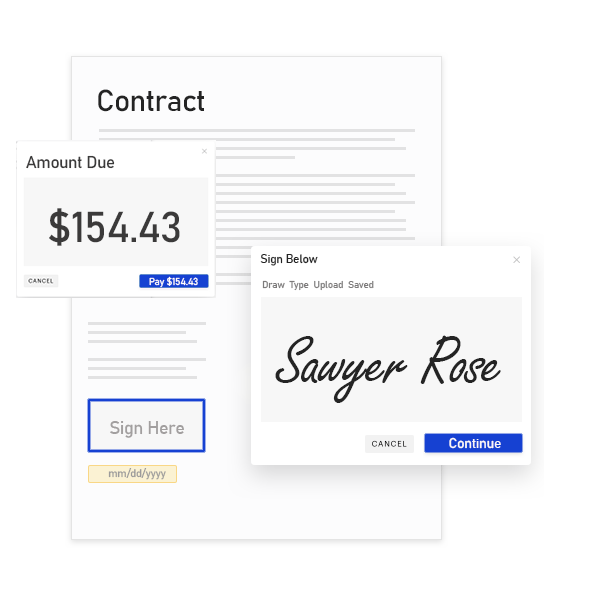In the modern world, almost everything has become digital. From the process of online shopping to automating complex business functions, several processes have become digital.
Talking about the business processes, an important thing that helps in running business operations is electronic document signing software.
Over a billion users worldwide are comfortable signing documents electronically.
But, are electronic signatures legally binding?
To put it bluntly, electronic signatures are legal. But the real question here is whether electronic signatures can create legally binding contracts. And, again, the simple answer is yes.

Supplement Your Remote Working and Go Paperless With E-Signature Adoption
WeSignature is an electronic signature service for small businesses that enables quick, productive, cost-effective, and legally compliant document signing process. Adopt this solution today and transform your business completely.
Electronic signatures are widely recognized and accepted worldwide, and are more secure than traditional paper signatures and are not easily forged.
In the blog, we will find the answer to a commonly deliberated question which is, “what makes an electronic signature legally binding?”
What are Electronic Signatures?
Similar to the inked signature, signing documents on the internet is a way of signing the documents, except for the fact that the e-signatures are pretty multi-dimensional. There are multiple ways in which this can be achieved.
You can create an electronic signature in word tool that enables you to sign the documents on a digital document. The presence of such a signature on a document might not give it legal status based on various factors that you might read later in the guide.
What Makes an Electronic Signatures Legally Binding?
In the year 2000, the U.S. government passed an act called ESIGN which was meant to simplify the adoption of electronic signatures. This act ushered in an entirely new era of document streamlining in the US locations where federal law is applicable.
According to this act, an electronic signature is known as an electronic sound, process, or symbol that is either attached to or logically associated with a contract or another record. The e-signature must be executed or adopted by a person with a clear intent to sign the record.
The ESIGN Act makes sure that electronic signatures can be used in a court of law as tangible evidence. They are legally viable options such as traditional signatures. In addition, the effect, validity, and enforceability of electronic documents are not denied.
Even after the passing of this law, so many businesses do not understand the legality of electronic signatures. Many people who are doing their business wonder if they can ensure that electronically signed documents can be held up in a court of law.
Is ESIGN Act The Only Enforceable Regulation?
No, the ESIGN Act is not the only enforceable regulation. Other than the ESIGN Act, the UETA or the Uniform Law Commission Act drafted in 1999 offers a legal framework for the use of electronic signatures online per state. The UETA Act helps in outlining the legalities of e-signatures relating to almost everything from transferrable records to automated transactions and the retention of records.
The UETA has been officially adopted in many US states and the ones that haven’t adopted this act, have their own e-signature validating regulations. Both the ESIGN Act and the UETA grant electronic signatures the status of conventional or wet ink signatures in the United States.
Both of these acts establish any law with a signature requirement that can be satisfied with the help of an electronic signature. They also help electronically executed agreements to be presented as evidence in court. In addition, they also prevent denial of enforceability or validity of an electronically signed document only because it is in electronic form.
How to Ensure that Your Documents are Legally Binding in the US?
To make sure that an electronic signature is legally binding, it is important that the below-mentioned criteria are met.
Have a look to know more.
Intention to Sign and Opt-Out
Just as traditional wet ink signatures, electronic signatures online are valid only when a user shows a clear intention to sign the document. For example, a good online signature software enables the users to choose out of electronically signing a document by offering an option to decline the signature request.
Electronic Business Transaction
The parties involved in a business transaction should consent to do their business electronically. Most of the leading e-signature software applications prompt users to confirm their consent much before they sign the documents.
Cause of a Signature
The complete context and circumstance under which a document was signed can indicate the cause behind an electronic signature. A software application ensures the complete attribution of an electronic signature by offering a detailed audit trail.
This trail goes from the signer’s email ID to the device’s IP address to the signature timestamp every time they sign a document electronically.
Association of Signature With Record
It is important for electronic signatures to be completely connected to the document that is being signed. The documents should not be transmitted to anyone except when they are a part of a signed document sent by the signer.
Retaining a Record
The ESIGN Act also ensures the validity of an electronic signature as long as they reflect agreement and also can be reproduced as and when it is needed. Most of the leading electronic signature solutions address this problem by offering a completed signed copy or by allowing them to download a copy of the signed document.
All these factors play an important role in choosing a legally binding electronic signatures software application that solves all possible purposes.
What are the Different Types of Electronic Signatures?
Aside from the obvious differences in the verification processes, electronic signatures serve the same purpose as handwritten signatures.
In general, there are three types of electronic signatures:
Basic Electronic Signatures
A simple electronic signature is a digital mark placed on a document to indicate agreement. This type of signature is a scanned image of a handwritten signature that is uploaded to a Microsoft Word or PDF document.
Secure Electronic Signature
Secure electronic signatures are similar to basic electronic signatures, but they include additional security features to make document validity easier to verify. This type of signature can be created using smart signature software such as WeSignature.
For example, when a signer uses the WeSignature to create an electronic signature, a certificate containing the signer’s time, date, IP address, and email is automatically created and added to the document. The signature is also stored on a secure server to ensure full compliance with current regulations.
Digital Signature
Digital signature is the most secure type of electronic signature. They are based on a standardized framework called public key infrastructure and involve multi-level encryption (PKI).
The signer must obtain a digital certificate from a certification authority (CA), which is stored securely and can be attached to a document to indicate approval. When a digital signature is added to a document, it generates a hash, which is a compressed version of the signature.
Afterwards, the hash can be compared with the public version of the signer’s certificate. If it matches, the document is valid. On the other hand, if there is a mismatch, the document has been tampered with.
Although digital signatures are the most secure of all electronic signatures, they are also the most expensive and require special software to use. They usually only require certain types of files.
You can read the blog about digital signature vs electronic signature, if you want to know in-depth comparison.
Why Should You Use WeSignature Instead of Other E-Signature Software?
WeSignature provides contract electronic signature solutions that are independently verifiable. This means you don’t have to rely on WeSignature to verify the authenticity of a signed contract. Even if we were to vanish from the face of the earth, your signed WeSignature document would still be verifiable.
Regrettably, this is not the case with the majority of e-signature vendors on the market today. As a trusted e-signature vendor, we believe that providing a verifiable and qualified e-signature is the de facto standard.
A Complete Platform Different From Traditional Electronic Signature Providers
WeSignature’s comprehensiveness gives it an advantage over other e-signature service for small business on the market today. WeSignature may appear to be just another e-signature service, but that is not the case. Using electronic signatures on your documents is only one aspect of a much larger picture.
Create and Manage Contracts in a Collaborative Setting
Work with your team and peers to handle only one version of the contract at a time. With the help of digital contracts, even after the contract is sent, the contract can be edited in real time.
There is no need to resend a new version every time there is a change. With the help of powerful search tools, finding old contracts is a breeze. The comprehensive dashboard shows all pending, sent and active contracts of your company. You will also receive automatic notifications when you need to renegotiate or renew the contract.
Enable Your Company to Use and Process Contract Data
By transforming unstructured data into structured data, the contract becomes part of the entire organization’s workflow. You can integrate WeSignature into your existing processes and systems to make everything run smoother and make better decisions.
If you want to simplify the sales, recruitment or purchasing workflow by creating functions other than electronic signatures, WeSignature is the platform for you.
Final Words
An effective electronic signature solution will not only let you create a document and manage it but will also enable easy management and quick processing of documents. It will offer many searching tools while helping in finding old contracts. There is also a dashboard where you can find all the old contracts and sort them into pending, sent, or active contracts.
In case you are looking to streamline your marketing and sales efforts, then an e-signature solution is right for you.
Are you looking for a simple way to collect electronic signatures? WeSignature has everything you need to collect signatures quickly, easily, and securely—while also ensuring that they are legally valid.
FAQ – Legally Binding Electronic Signature
1. Are Electronic Signatures Valid in All States?
YES! There are two main electronic signatures laws in the United States: the Electronic Signatures in Global and National Commerce Act (ESIGN) and the Uniform Electronic Transactions Act (UETA).
The ESIGN Act, enacted in 2000, established the legal validity of electronic signatures in interstate commerce. The law recognized that electronic signatures can have the same legal effect as traditional paper signatures, as long as certain requirements are met. The ESIGN Act applies to electronic records and signatures used in transactions involving interstate commerce.
The UETA, on the other hand, is a uniform law that has been adopted by most states to govern electronic transactions within the state. The UETA provides a framework for the use of electronic signatures and records in intrastate transactions, including rules for signature verification, record retention, and contract formation. While the UETA is similar to the ESIGN Act in many respects, it is important to note that there may be some differences in the requirements and application of the two laws.
2. When are Electronic Signatures Legally Binding?
Electronic signatures are generally legally binding when they meet certain requirements. In the United States, the Electronic Signatures in Global and National Commerce Act (ESIGN) and the Uniform Electronic Transactions Act (UETA) provide a framework for the use of electronic signatures in interstate and intrastate transactions, respectively.
To be legally binding, an electronic signature must meet the following requirements:
Intent to Sign: The signer must have the intention to sign the document.
Consent to do Business Electronically: The signer must have given consent to do business electronically.
Association of Signature with the Record: The electronic signature must be associated with the electronic record being signed.
Record Retention: The electronic record and signature must be retained in a manner that is accessible and capable of being reproduced.
Verification of Signature: The electronic signature must be capable of being verified.
Meeting these requirements ensures that electronic signatures have the same legal effect as traditional paper signatures. However, it’s important to note that there may be additional requirements or restrictions imposed by state laws or specific contracts. Therefore, businesses and individuals should consult with legal counsel to ensure compliance with applicable laws and regulations.
3. Does Legally Binding Electronic Signature Valid Outside the US?
Electronic signatures are becoming increasingly prevalent in global commerce, but the legal validity of such signatures outside the United States can vary depending on the country and applicable laws. However, many countries have established laws and regulations similar to those in the United States to recognize the legal validity of electronic signatures.
For example, in Europe, the eIDAS Regulation establishes a harmonized framework for electronic signatures and trust services across the European Union, recognizing three types of electronic signatures with advanced and qualified signatures having the same legal effect as handwritten signatures. Similarly, in Canada, the Personal Information Protection and Electronic Documents Act recognizes electronic signatures as legally binding as long as certain requirements are met.
While the legal landscape surrounding electronic signatures can be complex and vary from country to country, the trend towards recognizing their legal validity is increasing globally. As technology continues to evolve and new laws and regulations are established, the use of electronic signatures is likely to become even more prevalent in international commerce.
4. Is a PDF Signature Legally Binding?
Electronic signature in PDF documents can be legally binding if they meet the requirements set forth by applicable laws and regulations. The Electronic Signatures in Global and National Commerce Act (ESIGN) and the Uniform Electronic Transactions Act (UETA) in the United States recognize electronic signatures, including those made on PDF documents, as legally binding if certain conditions are met.
These conditions include demonstrating the signer’s intent to sign, providing consent to do business electronically, being associated with the signed record, and providing verification of the signature. You can also use transparent signatures in PDF documents. It’s important to ensure that PDF documents and electronic signatures meet the specific requirements for your industry and jurisdiction.




